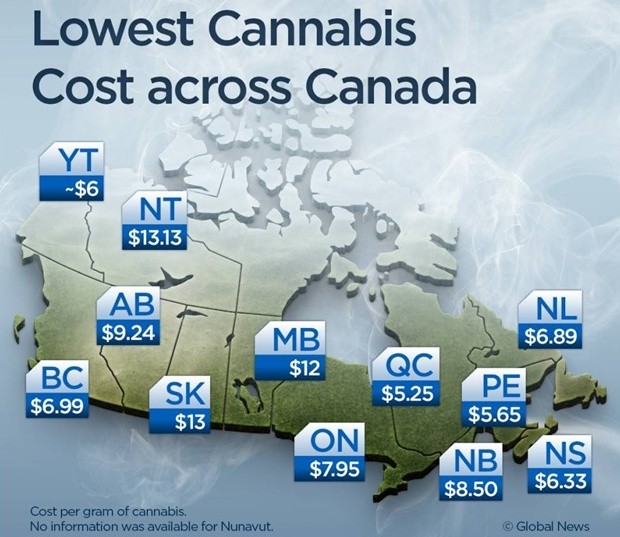Cannabis
Producers Struggle to Find the Positives in Canada’s Legal Weed Market
October 17th was a momentous day for many Canadians around the nation. The legalization of recreational marijuana was to mark a big forward step for liberalism and the concept of completely free trade. For many though, both producers and consumers, everything is not quite as positive as it should be.
There are a number of key issues which are taking a heavy toll on the industry, producers especially. This has led many to even abandon the legal Canadian market entirely and focus their endeavors on the EU and neighbors to the south. Why then has there been this negative backlash of sorts from both producers and consumers? Here are a few of the key issues which are currently disrupting the legal market sufficiently.
Licensing Troubles and a Pricing Dilemma
Whilst demand is outstripping supply at the present moment, many producers are still facing a long backlog in becoming licensed. This is due in the most part to the bureaucratic difficulty in getting approved for a sales license. The arduous process of obtaining a sales license from the appropriate authorities can take more than one year, and involves a number of audits and two full crops which must be submitted for testing. This is a process which many producers find highly unattractive, not only because of the time aspect, but also the associated costs.
Those who have received a license, whilst struggling to keep up with demand at present, are also struggling with the pricing of legalized marijuana in many regions. These vary slightly nationwide depending upon quality and location, however, there are many places like B.C. which are seeing prices as low as $4 per gram. When considering the cost of growth, production, and preparation for sale, this pricing is simply unsustainable at any rate of demand.
A large factor within the pricing issue has been due to the fact that there is really no model in place financially to forecast demand and pricing around the country. The precedents which have been set in the U.S. are on a negative note, such as Oregon where prices are heavily declining with a majority of producers going out of business thanks to a similar situation which Canada now faces. The real danger is that, similar to our southern neighbors, the government encouraged growth, when combined with the backlog in getting the weed to market legally, will in time mean a vast oversupply of legal marijuana and a tumbling price.
Quality Overtaken by Quantity
In a current market where demand is at a high, many are being pressured to sacrifice quality in order to get the product to the consumers faster. This is a pressure which many producers had never imagined, and most are unhappy to make it. This again is driven by the low pricing which for many is untenable in the long-term, and also a fundamental pride and lack of willingness which many producers have to sacrifice on quality. Ultimately, this has a longer-term impact on consumers too. A producer does not want to tarnish a reputation they may have worked years to create, be it in a legal market or otherwise, for short-term gain. The fact is that many of the top quality plants which producers could easily sell on the black market are deemed unsuitable for the legalized market. Again, this is what many deem to be an overreach by the government regardless the legality of the product, and it does lead to substantial losses for producers if a crop fails to match up to specification.
Shortage of Workers and Security Issues
The industry is also suffering from a number of other issues, namely the vast shortage of employees within the sector, particularly on the lower greenhouse levels. This is making it increasingly challenging from producers to meet the government quality and production requirements and also satisfying the market demand in a reasonable time.
The most prominent example of this was on display just prior to legalization when Aphria announced they would be unable to fulfill supplies for the first couple of months and had to stomach a loss of crop totaling almost $1,000,000. This destruction of the crop has been an unfortunate side effect of legalization, and is something which smaller producers simply cannot survive with.
There are a variety of reasons why producers are having a difficult time attracting greenhouse employees in particular. The main reason is due to the low pay, combined with the sweltering conditions which exist in greenhouses by nature. As the supply of employees falls, wages demanded is sure to rise, and with that, the cost of production sees another price rise which it can ill afford.
Data security of both customers and suppliers is also an issue which has been brought to the forefront of the current problems. This is due to the recent data breach from Canada Post. This breach, although largely glossed over by the national mail carrier, is thought to have exposed the personal details of as many as 4,500 customers within the industry. The knock-on impact of such an incident has greatly worried consumers, and shaken confidence within the industry, thus negatively impacting suppliers. Many are worried that the exposure of these details could make them vulnerable to criminal gangs, and also cause future difficulties with international travel.
Any Solutions in Sight?
For the moment, a solution to the woes of many producers seems to be quite a way off. The solution which many producers are implementing for themselves is an under the table one. This is, to continue to supply both the domestic and international black markets in some cases. The simple reasoning behind this is because they can do so for a high price, (X2 or more in many cases), and through following less stringent regulatory requirements.
The likely story is that this trend will continue feeding the black market for quite some time until the Canadian government can bring together all the related parties and propose a more agreeable future path.


